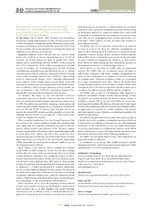| dc.contributor.author | Mukumbang, Ferdinand C. | |
| dc.contributor.author | Kriel, Ebrahim | |
| dc.contributor.author | Wyk, Brian Van | |
| dc.date.accessioned | 2021-01-06T11:15:29Z | |
| dc.date.available | 2021-01-06T11:15:29Z | |
| dc.date.issued | 2020 | |
| dc.identifier.citation | Mukumbang, F. C. et al. (2020). Desperate times call for desperate measures: Adapting antiretroviral service delivery in the context of the COVID-19 pandemic. South African Medical Journal, 110(8), 711-712 | en_US |
| dc.identifier.issn | 2078-5135 | |
| dc.identifier.uri | 10.7196/SAMJ.2020.v110i8.14967 | |
| dc.identifier.uri | http://hdl.handle.net/10566/5581 | |
| dc.description.abstract | On 23 March 2020, President Cyril Ramaphosa
announced a nation-wide lockdown to help curb the spread of the
COVID-19 epidemic in South Africa (SA). While these containment
measures are considered to have limited the spread of COVID-19 in
SA, the economic and social consequences, including the impact on
healthcare service delivery, are prominent.
Regarding healthcare service delivery, there are concerns about
people who could be at risk of experiencing severe COVID-19
infection, and about meeting the needs of people with chronic
diseases such as people living with HIV (PLHIV). In the context of
the COVID-19 pandemic, PLHIV with an unsuppressed viral load
may be at increased risk of developing severe COVID-19-related
conditions and potentially dying, especially those who are co-infected
with tuberculosis (TB). | en_US |
| dc.language.iso | en | en_US |
| dc.publisher | SAMA | en_US |
| dc.subject | Covid-19 | en_US |
| dc.subject | Service delivery | en_US |
| dc.subject | South Africa | en_US |
| dc.subject | Health care service | en_US |
| dc.subject | ART | en_US |
| dc.title | Desperate times call for desperate measures: Adapting antiretroviral service delivery in the context of the COVID-19 pandemic | en_US |
| dc.type | Article | en_US |

